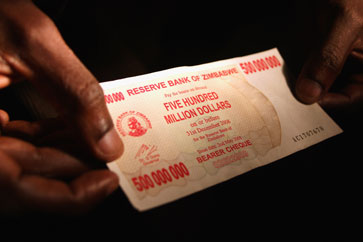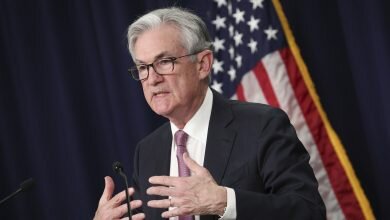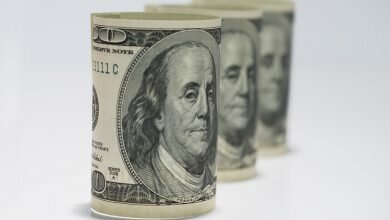Investors excited about Zimbabwe’s gold minting plan to curb inflation

Harare, Zimbabwe Zimbabwe is set to introduce gold coins that enable investors to store value within the country as inflation spirals out of control and the local currency continues to depreciate rapidly against major currencies.
The move comes after inflation for June rose to 191.6 per cent from 132 per cent in May.
In a statement on Monday, John Mangudya, the head of the southern African country’s central bank, announced that the new gold coins would be available through normal banking institutions.
“The Monetary Policy Committee (MPC) of the Reserve Bank of Zimbabwe has resolved to introduce gold coins in the market as an instrument that will enable investors to store value,” Mangudya said. “The gold coins will be minted by Fidelity Gold Refineries (Pvt) Ltd and sold to the public through normal banking channels.”
Fidelity Gold Refineries (Pvt) Limited is the only gold buying entity and refining entity in the country and is owned by the central bank.
The central bank’s Monetary Policy Committee expressed great concern over the “recent rise in inflation”, which rose to 30.7% on a month-on-month basis for June 2022.
Officials are struggling to pull Zimbabwe out of the grip of an economic crisis characterized by high inflation, a rapidly devaluing local currency, 90 percent unemployment and dwindling manufacturing output.
The country’s inflation has been on an upward trajectory over the past three months as inflationary pressures have increased, driven by continued weakening of the Zimbabwean dollar which is trading at $1:650 on the black market.
The printing of new money by the central bank has also worsened the situation, reversing the gains made in the past two years, with inflation falling from a peak of 800 per cent in 2020 to 60 per cent in January this year.
As part of measures to stabilize the economy, the central bank will more than triple the lending rate from 80 per cent to 200 per cent per annum and raise the interest rate from 50 per cent to 100 per cent per annum.
Harare-based independent economist Victor Bhoroma lauded the apex bank’s intervention, saying positive interest rates would reduce both “speculative lending in the economy and money supply growth”.
“Gold coins are a good idea in terms of storage value. This could be a way of easing pressure on the US dollar if the gym is sold in dollars to stabilize inflation,” Bhoroma told Al Jazeera. “But they will probably be denominated in US dollars which means it is a fundraising scheme by the central bank to get the USD out of the market. Thus the success is due to the trust in the central bank as the seller of the coins and to return them. will depend on the guarantee.”
He added that if the decline in confidence continues, the market will favor hard currencies.
a welcome development
It seems investment analysts are toying with the idea of gold coins.
Batanai Matsika, Head of Research, Morgan & Co, stockbroking firm, said gold coinage was a welcome development in the market in the absence of investment options and would help investors hedge against inflation.
“For a long time, there were not many investment options in the market and this is a new asset class,” Matsika told Al Jazeera via telephone. “The thinking was driven by the need to come up with a tool that addresses the problems of inflation in an economy where there has been an erosion of purchasing power. What we are collecting is going to be a store value.”
There are certain fundamentals of gold that help protect it from inflation and geopolitical risk, he said, adding that the concept was not entirely new.
“This idea is being emulated from Kruger Rand,” Matsika said. “It’s also a way to open up the gold market to ordinary investors. From an investment advisor’s point of view, this is an area that is potentially exciting. It could prove worthwhile.”
Tatenda Mbhande, economist at Harare-based Akribos Capital, expressed optimism about the gold coin’s ability to act as a store of value.
“With respect to the coin acting as a store of value, this is a good move as the Zimbabwean dollar was losing value. People were going after the US dollar as a store of value,” Mbhande told Al Jazeera “This is going to ease the pressure on the US Dollar but the demand for USD will still remain there. However, we do not see the gold coin addressing exchange rate fluctuations.”
He said the gold coin was an attempt by the government to curtail the demand for the US dollar.
“As long as Zimbabwe remains a net importer, there will still be demand for the dollar,” he said. “On the way, the bad money will drive the good money out of the market. We also have the possibility of missing coins.”
For gold coins to be effective, Mbhande said those who wish to acquire them should be able to pay with Zimbabwean dollars, not US dollars, to remove the excess local currency in circulation.
Mbhande said the central bank needs to ensure that the face value of gold coins “always exceeds its intrinsic value” so that they can be treated as money and for investors to consider it as an alternative to the US entity. can be used.
Central bank spokesman Isaac Muzambi did not respond to Al Jazeera’s queries on the expected timeline for the introduction of gold coins.
new measures
The new measures by the central bank come as President Emmerson Mnangagwa, who has been in charge since November 2017, is reportedly desperate to address some of the legacy economic problems that have plagued his administration.
On Saturday, Mnangagwa promised to announce additional economic measures to stabilize the economy. On Monday, Finance Minister Mathuli Ncube announced a slew of measures, which are being reviewed, among other things, an increase in the salaries of civil servants, and the health sector and teachers’ allowances.
Ncube also blamed businesses and Zimbabweans for driving up inflation and the collapse of the Zimbabwean dollar.
Speaking to reporters in the capital, he said his claims were substantiated by a recent “econometric study conducted by the University of Zimbabwe” and that inflation “may not be caused by ordinary real economic variables but by behavioral variables such as confidence, unfavorable inflation expectations”. has been.”
Ncube also banned price discounts for payments made in US dollars, warning those who were prosecuted and operating licenses for offenders would be revoked.
Bhoroma said the minister’s measures were nothing to write home.
“Nothing was bigger than the Treasury statement, considering the fact that the USD is already legal tender based on the Finance Act of 2009 and 2012,” he said. “The legislation to ensure the protection of US dollar credit is a welcome step in bringing stability and certainty to banks that obtain lines of credit to further lend to the business sector.”
He said the removal of the levy on diesel and the reduction in fuel levies would have minimal impact on the fuel price in the country as prices in Zimbabwe “are among the highest in the SADC region, thus making local products uncompetitive”.



